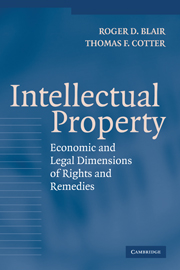Book contents
- Frontmatter
- Contents
- Acknowledgments
- 1 Introduction
- 2 The Law and Economics of IPRs
- 3 A General Theory of Damages Rules
- 4 Departures from the General Theory
- 5 Liability Standards for IPRs
- 6 Who Is an Infringer?
- 7 Who Should Be Entitled to Sue for Infringement?
- 8 Calculating Monetary Damages
- 9 Concluding Remarks
- Bibliography
- Index
4 - Departures from the General Theory
Published online by Cambridge University Press: 08 January 2010
- Frontmatter
- Contents
- Acknowledgments
- 1 Introduction
- 2 The Law and Economics of IPRs
- 3 A General Theory of Damages Rules
- 4 Departures from the General Theory
- 5 Liability Standards for IPRs
- 6 Who Is an Infringer?
- 7 Who Should Be Entitled to Sue for Infringement?
- 8 Calculating Monetary Damages
- 9 Concluding Remarks
- Bibliography
- Index
Summary
In Chapter 2, we discussed the principal economic justifications for IPRs. In Chapter 3, we proposed a damages rule, consistent with these justifications, under which the IPR owner would recover the larger of her own lost profit or the defendant's profit attributable to the infringement. Ideally, this would be subject to appropriate modifications when necessary to prevent either overdeterrence or underdeterrence. The rules that U.S. courts actually apply in patent, copyright, and trademark law, however, depart from our proposed rule in some important ways. In this chapter, we consider in some detail these departures and begin with the absence of a restitutionary remedy in U.S. patent infringement cases. As we shall see, this rule – which is at odds with our recommendation that the prevailing patent owner be entitled to the greater of her own lost profit or the defendant's profit attributable to the infringement (i.e., restitution) – may be justified by the difficulty (high private and social cost) of properly calculating the portion of the defendant's profit attributable to the infringement, but we remain skeptical. Awarding the prevailing patent owner the amount of the royalty the parties would have agreed to ex ante hardly appears to be a simpler task.
Second, we analyze the availability of statutory damages under U.S. copyright law. On its face, this rule also, violates our precept by permitting the court to award an arbitrary sum, unrelated to either the plaintiff's loss or the defendant's gain.
- Type
- Chapter
- Information
- Intellectual PropertyEconomic and Legal Dimensions of Rights and Remedies, pp. 70 - 95Publisher: Cambridge University PressPrint publication year: 2005



